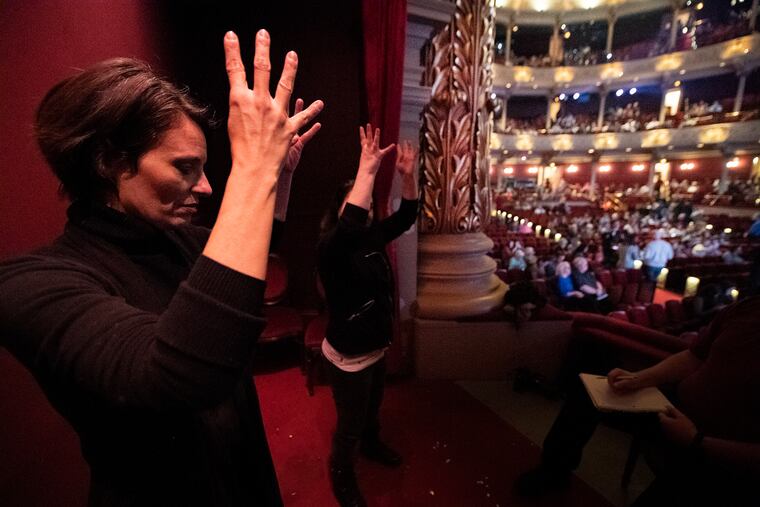Meet the busy, busy ASL signers who work Philly’s theater circuit
Hands UP Productions has a roster of 25 signers who work Philly's theater circuit. From "Hamilton" to "Mean Girls" to "A Christmas Carol" to "The Snow Queen," they've had their hands full.

During a time when Philadelphia theater is vibrant and fast-moving — especially as was the case with Hamilton at the Forrest Theatre, with 20,520 words artfully crammed into 2 hours and 23 minutes, breaking down to a dizzying 144 words per minute — the American Sign Language (ASL) interpreters at the local business Hands UP Productions have their hands full.
Tuesday night, three interpreters and an ASL coach rehearsed from the sidelines at the Academy of Music as that evening’s production of Mean Girls played out onstage.
Broadway Philadelphia offers one ASL-signed performance of every national touring production. With Mean Girls’ signed show scheduled for the Friday night after Thanksgiving, this was cram time.
» READ MORE: ‘Mean Girls’ at the Academy of Music is as smart and delightful as Upper Darby’s own Tina Fey
Next come the ASL-signed productions of Shrek the Musical at Walnut Street Theatre and A Christmas Carol at the Walnut Kids (both Dec. 12), The SpongeBob Musical at the Forrest Theatre (Dec. 13), the People’s Light’s Christmastime panto Little Red Robin Hood (Dec. 21), The Snow Queen at the Arden Theatre (Jan. 17 and 18) … and the list goes on.
From the teen chatter of Mean Girls to the Newfoundland vernacular of the recent Come From Away, each production has its own rhythm and patois. Deaf and hard-of-hearing patrons want to “see the music,” says Hands UP’s cofounder Brian Morrison, so the lyrics, vocal style, melodic sway, and rhythm are all details that the interpreters try to convey through hand signs, facial expressions, and movement.
“If a hearing audience is feeling a song is fast, with tons of info, I want deaf audiences to say the same thing. They need to have that parallel experience. I can produce facial expressions to show a character’s anger or sadness, and body language to portray physical or emotional characteristics,” Morrison says.
"When we did Peter Pan at the Arden a few seasons back and I played Captain Hook, I signed the entire show with a hook on my hand.”
‘We need to capture the essence’
Lin-Manuel Miranda’s rapid-fire rap musical was this season’s biggest challenge. “I never rehearsed a show as much as I did Hamilton, just to get the speed and amount of information down,” Morrison said. “We need to capture the essence of who the performers are. … And our job is to convey that same emotion.”
Brian Hajjar, audience services coordinator for the Shubert Organization, which owns and operates the Forrest Theatre, says their work is theatrical art in its own right. “These interpreters want to best emote the feelings the characters are feeling. Every night, that could be different — hence, the live magic of theater.”
Mostly, Hands UP’s ASL interpreters stand to the side of the stage, but for the Arden Theatre’s children’s programming, they sign on stage, amid the actors, doing what’s known as “shadow interpretation.”
“We move around and interact with the casts, and in some cases, actors learn signs and even interpret their own lines," Morrison says. "It puts us, and the deaf, in the middle of the action.”
While the Arden uses screens with LED captioning for adult shows, it’s not a good option for kids “because of age and their inability to read quickly” and because it can be too distracting, says Clayton Tejada, the Arden’s general manager.
Kids also connect with “the physicality of shadowing,” Tejada says, with the interpreters "traveling with the actor, embodying the actor’s mood, and flowing into the play nicely.”
Part of the community
Hands UP’s ASL signers are an integral part of the local theater community, says Theatre Philadelphia executive director Leigh Goldenberg, who hired Morrison and his cofounder, Donna Ellis, to sign this fall’s Barrymore Awards. And they’re part of a larger effort to expand live theater to new audiences, along with captioning, translation, relaxed performances, and other efforts.
To keep up with demand locally, Hands UP offers an in-depth, 10-month training program in theater-focused interpretation. “We are definitely looking to expand our pool,” Morrison says. (It costs $350, and you need to be fluent in ASL to enroll.)
Hands UP’s ASL interpretive performances tend to cost a theater between $1,000 and $2,000 a show (including rehearsals), so many venues and productions opt for captioning instead. People’s Light, in Malvern, is helping to pioneer new high-tech caption glasses.
» READ MORE: Caption glasses at People’s Light theater are among first in U.S., aiding the deaf and hard of hearing
John Orr, executive director of Art-Reach, says that while accessibility for the deaf and other patrons with disabilities has improved, budgeting and funding for ASL interpretation, captioning, and other accommodations are too often afterthoughts.
“We still don’t see a ton of organizations proactively planning to have accessibility as a specific feature of their organizational budgets, or in strategic plans,” he says, and “there isn’t a single funder who requires any type of accessibility audit as part of their funding stream.”
"I hope someday we get to the point that any accommodation request — ASL, verbal description, captioning, etc. — is available on demand for anyone who enters a theater.“
The full schedule of Hands UP Productions’ ASL-interpreted shows for the region’s current theater season is online at handsupproductions.com/2019-2020-season.